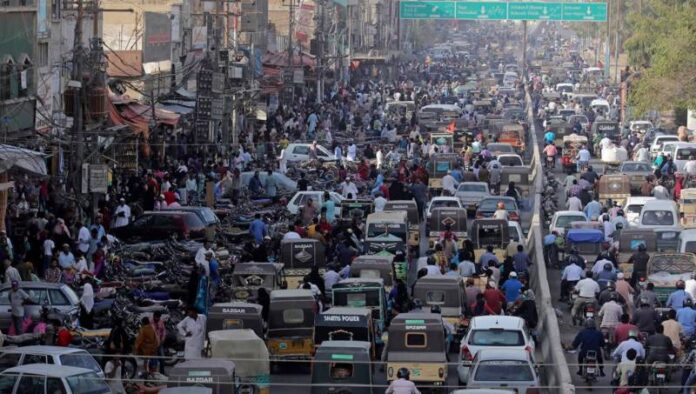RAWALPINDI, Feb 16 (APP): Rapid urbanization, mounting vehicular pressure and massive construction activity is posing serious environmental and health hazards in twin cities with residents calling for immediate measures for coping with this phenomenon.
As observing environmental quality standards by vehicle owners, construction companies and industries are least observed, the health experts are concerned about human health in twin cities especially the garrison city, Rawalpindi due to rising air pollution.
In their opinion, the city is polluted with carbon dioxide, nitrogen dioxide and sulphur dioxide that affect their upper respiratory system with reports of increasing number of patients suffering from flu, allergy, cough and fever during months from October to February.
“Health of our skin, lungs, kidneys and entire respiratory system is affected by quality of air we breathe,” said Dr Ashfaq Ahmed. “Industrial units set up in residential areas and smoke emitting vehicles add to spread of different allergies. Elderly people, children and those suffering from asthma fall an easy prey to this phenomenon.”
He recommended initiatives to enhance green spaces, community awareness campaigns and strict implementation of laws and regulations to improve the situation as trees and vegetation naturally absorb sound and carbon emissions. “Community and local groups should advocate for quieter neighborhoods and encourage citizens to report noise violations, fostering a sense of collective responsibility.”
Dr Ashfaq also stressed to improve surfaces of busy roads to reduce vehicular noise, widen lanes and roundabouts to avert congestion and use of noise-mitigating technologies and practices in new construction projects.
“Besides industries and vehicle owners, builders should also be encouraged to incorporate soundproofing techniques as combating air and noise pollution is becoming crucial for sustainable and healthy urban environment,” he remarked.
Muhammad Asif, a school teacher has also raised concerns on mounting traffic load with vehicles using pressure horns unnerving the people, traffic jams every day and occasional use of adulterated fuel exposing the citizens to various mental and psychological health hazards.
“Private vehicles like rickshaws, loaders, buses and mini vans and even personally used vehicles blowing horns unnecessarily and emitting smoke in traffic jams have become a continued headache for residents,” he said. “Pressure horns have become a social course. Drivers freely use these horns unchecked only due to poor implementation of laws on noise pollution.”
He said, in recent years noise pressure has increased in Rawalpindi and authorities need to strictly enforce environmental laws to protect people from all sources of noise. “They should adopt a comprehensive and consistent policy based on awareness, precautions and penalties to control air and noise pollution.”
Air quality in thickly-populated areas around Raja Bazaar, Murree Road, Tench Bhatta, Pirwadhai and several other downtown areas is degrading with each passing day due to smoke emitted by industries, workshops and other businesses established in thickly-populated areas.
“We seldom see action by authorities on these violations,” said Mushtaq and Faisal, residents of Tench Bhatta. “Factories mostly preparing polythene bags, plastic chapals and other products being run in thickly populated areas, continue to function in violation of laws and adding to air and noise pollution.”
Mentioning to dumping of waste generated from these units into Nullah Leh, these residents have urged efforts by Pak-EPA and local administration to monitor pollution level, compile data on its sources and effects, strictly implement pollution laws and aware masses through electronic and social media.
“Establishment of air quality monitoring stations in the city can facilitate in real-time data collection that would be vital for assessing air quality and implementing evidence-based policies,” these citizens recorded.
Since, the Punjab government is performing the commendable task of removing encroachments and cleanliness drive there is also need to include air and noise pollution control in its campaign.
As the challenge grows with every passing day, the District Administration spokesman mentions to intensified efforts of local authorities and environmental organizations to combat pollution and promote a healthier urban environment.
“We have taken several steps to enforce environmental regulations to reducing vehicular and industrial emissions. We employ strict standards for vehicle emissions and conduct regular inspections to ensure compliance,” he said.
He said the government initiatives encourage use of cleaner fuel and technologies to mitigate pollution, upgrading public transportation with lower emissions, running eco-friendly buses and efficient metro system to reduce vehicles number on roads and improve air quality standards.
“Various organizations and community groups are running campaigns to educate public about sources and effects of pollution, promote green practices like planting trees and using bicycles and highlight importance of individual contributions to improve air quality,” he said.
“Local authorities are enforcing strict regulations, especially in the residential areas, to curb the incessant sound from construction activities, traffic, and social gatherings,” the spokesman said. “Time restrictions for construction work and regulations on loudspeaker use are being applied.”
He said the Punjab government is also revising urban planning and zoning laws to create buffer zones between noisy establishments and residential neighborhoods.
An EPA Inspector also mentioned to action against brick kilns, not converting to zigzag technology, raising 18 such kilns in the district. “Besides other actions, four pyrolysis plants had also been demolished for burning tyres as fuel. We hope these actions to improve air quality.”
APP/azh/maz (APP Feature Service)

